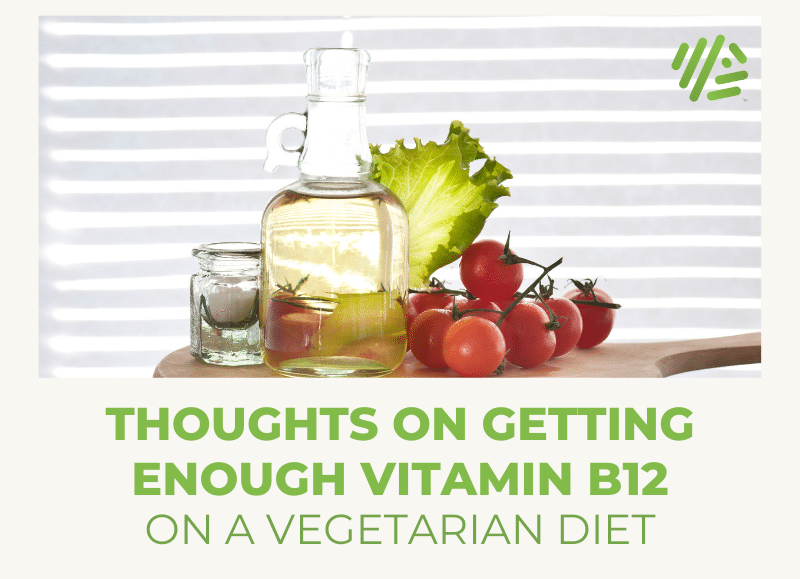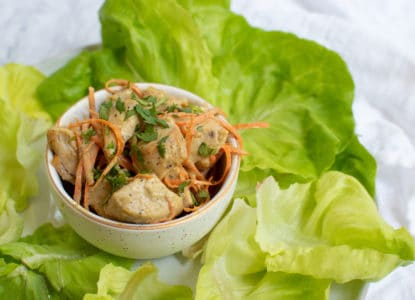Thoughts on Getting Enough Vitamin B12 on a Vegetarian Diet
Genes Mentioned

Contents
There aren’t a lot of things the nutrition world agrees on, but this may be one of them: vegetarians, and especially vegans, have a tough time getting enough Vitamin B12.
Vitamin B12 is an essential nutrient that, for the most part, only comes from animal sources, such as eggs, chicken, beef, and dairy products. Even vegan advocates in documentaries like The Game Changers concede that vegans will do best if they take supplemental B12.
Symptoms of B12 deficiency
If you’re not getting enough B12, you likely won’t feel your best. B12 deficiency can trigger symptoms such as anxiety, problems with sleep, low energy and even memory loss.
However, a true B12 deficiency is tough to identify and can take years to develop.
It is possible some people may experience low levels of vitamin B12 even without following a vegetarian or vegan diet. For this reason, it is important that everyone be cognizant of when vitamin B12 levels are entering margins below the recommendation. Quest Diagnostics lists 200-1,100 pg/ml as the “normal range” for vitamin B12 levels. So what are some signs and symptoms to be mindful of?
According to Harvard Health Publishing the following are symptoms that might suggest a vitamin B12 deficiency:
- Tingling, numbness, or abnormal sensations in areas such as the legs, hands, or feet.
- Anemia
- Weakness
- Fatique
- Cognitive difficulty: memory loss, inability to think or reason clearly (brain fog)
- Motor issues: problems walking or balancing
- Smooth tongue: feeling inflamed, tender, or swollen
If you are someone who is already adhering to a plant-based diet or plan to transition to a diet of similar nature, supplementation may be the best bet for that extra “boost” of B12 you’ll need. Though a food first approach for receiving the adequate recommendations of nutrients should always be the first line of defense, supplementation can be beneficial as well. But is supplementation enough and is it safe long term?
B12 supplements might not be enough
Here’s the thing: it’s not as simple as just going out and supplementing with B12, or any other B vitamin. If you’re committed to a vegetarian, or vegan, lifestyle, you’ll need a strategy to get as much B12 as possible from plant sources and move forward with caution with any supplementation.
As discussed in our recent blog on the link between B vitamin supplements and cancer, long term mega doses of folic acid, B6, and B12 are generally to be avoided.
B12 supplement dosing
For long term B12 supplementation, data suggests that it is a good idea to stay beneath a daily dose 0.4 mg, or 400 mcg, as higher doses may increase cancer risk. Our research shows that cancer risk was not increased for those who took B vitamins as part of a multivitamin, with Dr. Aaron Gardner, Head of Research at GeneFood, theorizing that the B2 played a protective role.
Putting all of that information together, the best course of action when considering any B12 supplement, is to follow a conservative dosing plan. This option is tricky to find in standalone B12 supplements. Stick to b vitamins in a multivitamin with a cocktail of other nutrients, like B2.
Most manufacturers that isolate B12 into a single product feel like they need to give consumers “their money’s worth,” and so they pack in either 1,000 or 5,000 mcg doses.
Avoid these supplements.
To borrow from the B vitamin and cancer risk post, it has been found that B complex formulas by both Thorne and Pure Encapsulations offered nice conservative B12 doses that were well below the 0.4 mg threshold recommended for consumption without risk.
B12 Deficiency and Gut Health
Another factor to consider when facing a B12 deficiency, is gut health. If the microbiome is out of balance, it will be that much more difficult to absorb nutrients from food. 2 For example, the holistic blogosphere is full of articles linking small intestine bacterial overgrowth (SIBO) to B12 deficiency.
For further research, Leigh, a writer and contributor to GeneFood, also wrote an excellent blog post recently about the genetics of nutrient absorption which is worth a read.
A note on B12 Analogs and “fake” B12
Many of the reputed natural, plant-based sources of B12 are actually paper tigers in that they appear to offer B12, but the form of B12 they contain isn’t usable, or “bioavailable” for humans. For example, using chromatography testing, researchers have isolated plant compounds in algae and mushrooms that are known as “corrinoid compounds,” which mimic B12, but which are inactive in humans. 3
One of the best examples of this is Spirulina. Although the marketing machines behind these products claim Spirulina has ample B12, these plants actually contain fake B12, which can test as B12 in some labs.t Additional research has shown these are false positives, and the actual B12 count is very low. 3
Are eggs a good source of B12?
This won’t help vegans, but vegetarians do have the option of resorting to eggs and cheese as source of B12 and other micronutrients. Will eating the occasional egg and cheese omelette help stave off B12 deficiency?
Don’t count on it. First, the population at large suffers from B12 deficiency, not just plant eaters. Next, eggs are not a particularly bioavailable source of B12, so eggs alone won’t help you keep your B12 levels at an optimal level.
But if eggs alone aren’t enough, and supplementation can pose a threat or is just too much work to monitor, are there other options to get B12 recommendations? Yes! The plant sources of B12 recommended below have been confirmed through laboratory testing to contain usable forms of B12.
What are The Best Plant Sources of Bioavailable B12?
Most of the best sources of vitamin B12 come from eating animal products, however, there are several plant species that contain B12.
Vegetarian B12 supplements
| Source | Dose | Notes |
| B-Complex | 100 mcg | Lower dose B12 considered safer by some studies. Thorne B6 dose on high side. |
| Dried green laver (Nori) | 63.6 mcg | 63.6 mcg/100 g per dry weight. Enteromorpha sp species. |
| Purple laver (Nori) | 32.3 mcg | 32.3 mcg/100 g dry weight. Porphyra sp species. |
| Lion’s mane | 1.09–2.65 mcg | Hericium erinaceus. Approximate 1.09–2.65 μg/100 g dry weight. |
| Chlorella tablets | 100 mcg | Eukaryotic microalgae Chlorella sp. Dose varies considerably by product, check labels. Based on 100g of dried weight. |
Nori
Popular in Japan, and also called laver, is a sea vegetable that has high amounts of bioavailable B12, as well as iron. 4 Nori provides one of the best, if not the best, plant based options for vegetarians and vegans looking for more B12 in the diet. Nori is widely available online and comes in dried flakes that can be sprinkled on salads, in smoothies, or even added to most dinner entrees.
Note: only two species of Nori contain bioavailable B12: dried green laver (Enteromorphasp.) and purple laver (Porphyra sp.)
A 2014 article, on vegetarian nutrition, notes that most other forms of algae have only trace amounts, if any, B12:
Dried green laver (Enteromorphasp.) and purple laver (Porphyra sp.) are the most widely consumed edible algae, and they contain substantial amounts of Vitamin B12 (approximately 63.6 μg/100 g dry weight and 32.3 μg/100 g dry weight, respectively). However, excluding these two genera, other edible algae contain zero or only traces of Vitamin B12.
Mushrooms
Although none of these mushroom species by themselves will give you anywhere close to your daily recommended amounts of B12 (you’d have to eat 50g a day of dried shiitake to meet your daily B12 requirements), they are useful to keep on the radar to add to the B12 bucket.
Remember, the strategy here is to be able to take a low dose B12 supplement and get the rest of what you need from food.
Shiitake, black trumpet, golden chanterelle, and Lion’s mane all contain some bioavailable B12 to give an “assist” on the vegetarian, or vegan, diet. 5 6 7
Chlorella tablets
Chlorella tablets, which are a species of microalgae, have also been shown to be good sources of supplemental B12. 8
Closing thoughts
If you’re on a vegetarian or vegan diet, there are certainly health advantages, but it’s also clear that there is a larger risk of vitamin B12 deficiency for those with these dietary lifestyles.
Because high dose B12 over extended periods of time has been linked to an increased risk of cancer, finding plant foods that can “top off” your B12 levels will be key.
In addition, maintaining or restoring gut health is a top priority as the state of your microbiome will affect absorption.
Shiitake, black trumpet, golden chanterelle and Lion’s mane mushrooms are a good bet, as are very specific species of Nori, which can be sprinkled on food or blended in a smoothie.
There are a variety of ways to sustain a vegetarian or vegan lifestyle without the risk of vitamin B12 deficiency. This is just the tip of the iceberg, but hopefully leads to a clearer path on how to detect and avoid B12 deficiency. Do the research, become knowledgeable, and find the routine that works best for chosen dietary lifestyles.



